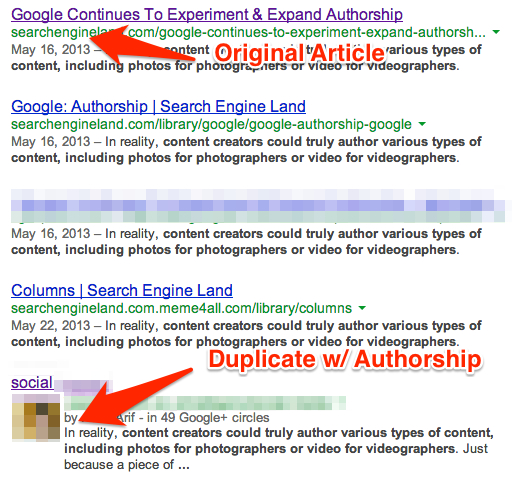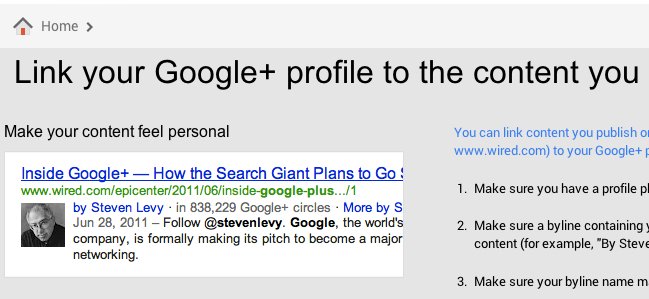Can Google Authorship Help Fight Plagiarism?
 Though Google Authorship Markup is well over a year old, it’s been getting a lot of attention recently as a means to prevent plagiarism, or at least prevent some of its worst impacts.
Though Google Authorship Markup is well over a year old, it’s been getting a lot of attention recently as a means to prevent plagiarism, or at least prevent some of its worst impacts.
But is this something Google Authorship can actually do? Though most seem to agree that Google Authorship comes with SEO benefits, including at least one case study that indicated content with Google Authorship is indexed more quickly, and it improves your click thru rate due to the larger visual presence, it’s less clear if it actually prevents Google from indexing infringing material ahead of original content.
However, there’s a lot of reason to think that it would. Google Authorship gives the search engine a verification that you are a real person, connected with a Google Account, and that you meet the other qualifications. Why would Google trust a site that has done none of those things over a site that has done all of them?
Yet, Google is always full of surprises and often times the results defy logic, or even its own rules. I decided to try and research this and, though I was only able to find a few examples, the results were far from definitive.
How and Why Google Authorship Works
The basic premise of Google Authorship is simple. You, as an author, create a Google+ profile, add your site to it and sign up for Google Authorship. From there, you’ll have to do three things:
- Make sure your profile photos is a recognizable headshot.
- Ensure each page carries a byline with your name (IE: Jonathan Bailey) and that the name matches your profile.
- Verify that you have an email address at the site’s domain.
Though there are other ways to do it, the above way seems to be the most common and is the most preferred by Google.
Once you do that, when your pages appear in search results your profile picture will be displayed alongside the results as well as information on your Google+ profile.

But while the benefits of having your image and an expanded snippet are obvious, many have theorized that Google will also weigh authorship in the general results. Any site that has jumped through Google’s hoops, theoretically, should get preferential treatment.
Basically, since the spammers and plagiarists, most likely, won’t go through the trouble of setting up Google Authorship for every profile, it makes sense that those who do should have an easier time outranking them.
Whether or not that’s true is difficult to answer.
Putting it to the Test
The problem with testing something like this is that we are testing the exception. Google, to its credit, gets authorship right well over 99% of the time. I tested two dozen links (half with authorship and half without) across a variety of established sites and found none where the original wasn’t at the top.
However, what I did find were several cases similar to the one below:

What you see is that the original site did not use Google Authorship on the article in question and still ranked well ahead of the duplicate created by a questionable site elsewhere. However, the duplicate site was using Google Authorship and had the “authors” pic and information in the snippet.
To be clear, in this case, the duplicate had every disadvantage imaginable. The original site is well-trusted and respected. The scraped page is actually a category page on the site, filled with other content, and, generally, it gave countless signals it was a poor quality result.
Still, this means two things that should be obvious:
- Google is weighing other factors in addition to and ahead of Google Authorship.
- Spammers, scrapers, etc. have started using Google Authorship as well, likely hurting its usefulness in content protection.
In short, while Google Authorship is definitely a badge of originality, the value of that badge is up for debate and it may not be as valuable as other, more traditional factors.
The Bigger (Potential) Problem
But while Google Authorship may help some with the relatively rare problem of a plagiarist beating original work in the search results, it can’t help with the more broad problem of duplicate content.
With the recent updates by Google, the search engine has gone on the warpath what it sees as content farming and duplicate content. Though it promises to not penalize sites that are infringed, Google admits that it isn’t perfect and will sometimes catch sites that are scraped in their nets.
In some cases, sites that are widely scraped or otherwise repurposed find themselves being penalized by Google and knocked down in the results. Basically, Google mistakes the site for a content farm or some other site pumping out unoriginal content and, while the duplicates don’t gain any advantage, the original still ends up suffering.
Authorship can’t protect against this problem and it seems to be the more common issue sites are facing. This is based on my personal experience both with my content and working with others having issues with scrapers.
Bottom Line
To be clear, none of this is to say that Google Authorship is a bad idea or something you shouldn’t do. You absolutely should set it up on your site if you’re able. It’s free, only takes a moment and provides several clear benefits.
However, don’t expect Google Authorship to make all of your content misuse issues disappear. It is at best one metric that’s weighed and observed among many others and its weight will likely decrease as spammers make heavier use of it.
After all, it’s not just something that the good guys take advantage of.
That weight and effectiveness is even less if you don’t actively participate in Google+ and work to grow your following there. After all, an account only in a few circles will, inevitably, be trusted even less than one with many.
The fundamentals remain intact. Good content, good inbound linking and a good social networking presence (including Google+) are all still important. Also, keeping an eye on your content’s use also doesn’t hurt, especially if you can stop anyone who goes too far.
Google Authorship is a great step to take, but like most “silver bullets” against plagiarism, it doesn’t live up to the hype that some have given it.
Want to Reuse or Republish this Content?
If you want to feature this article in your site, classroom or elsewhere, just let us know! We usually grant permission within 24 hours.
